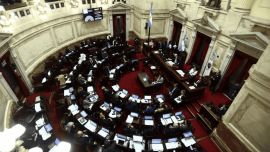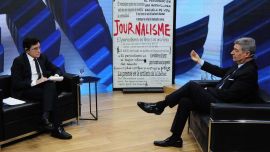Around 30 months after taking office, the country found itself in a desperate economic situation, with a troubling run on the peso and a faltering economy given the lack of reserves in the Central Bank’s coffers. The underlying problem, as usual, was an utter lack of confidence in the government’s capacity to put together and execute a credible economic plan, particularly at a moment of global tensions that inevitably affected Argentina. Once past the point of no return, then-president Mauricio Macri announced via televised remarks that he had instructed economy minister Nicolás Dujovne to seek an emergency bailout from the International Monetary Fund, then run by Christine Lagarde. What remained of Macri’s presidency was a nation on high-alert as the peso’s value continued to sink and a series of interchanging officials running the main economic institutions put in place emergency measures that allowed the administration to finish its constitutional mandate in flames, the first non-Peronists to do so since the return of democracy in 1983.
That was then. Coincidentally, President Alberto Fernández has been hit by a crippling run on the peso that has stretched out over several weeks during the 30th month of his Presidency, as an exhausted economic model has failed to generate confidence and Central Bank reserves. And it comes at a moment where a global re-evaluation of risk threatens to push advanced economies — and therefore the rest of the world — into recessionary terrain that includes high inflation and intense geopolitical risk, including an ongoing war sparked by Russia’s invasion of Ukraine. Argentina faces an incredible opportunity to take advantage of its natural resources yet record agricultural exports haven’t translated into a burgeoning all-around economy as a rebound in industrial sectors is stifled by a lack of dollars for investment and imports, while galloping inflation destroys workers’ purchasing power. The question everyone is asking these days – including vice president and detractor-in-chief Cristina Fernández de Kirchner – is whether Economy Minister Martín Guzmán will pull through for Alberto, or whether the crisis will trigger some sort of institutional crisis that forces him to call early elections or step aside.
At the Central Bank, Governor Miguel Ángel Pesce seems to have an initial answer. Shortly after having imposed new and stricter currency restrictions, Pesce indicated that current market stress should be resolved by October, when the brunt of winter’s cold weather is behind us and energy demand falls. Just a short, three months away! Pesce’s explanation is that energy imports surged from US$200 to US$900 million to US$1.6 billion in May and more than US$2 billion in June, in great part due to the war in Ukraine. “Excluding energy imports,” he told Jorge Fontevecchia in his daily radio show Modo Fontevecchia, “[Imports] are to the order of US$6 billion [per month], which means US$72 billion on an annual basis, compared to exports that are above US$80 billion and could reach US$90 billion, a level that would support stability in foreign exchange markets.” He acknowledged that the Central Bank had to bail out the domestic bond markets and indicated that a recent bond auction where Guzmán rolled over the debt and even attained net financing in pesos was a “positive outcome.” Since implementing the latest round of currency restrictions, Pesce’s Central Bank has picked up some US$1 billion in reserves from market operations.
Pesce’s extreme pragmatism rests on his capacity to rein in the dollar-peso exchange rate through increasingly restrictive measures, which will by definition hamper economic growth. As detailed by economist Julieta Collela, Guzmán was indeed successful in his bond auctions but at an increasingly higher price. The Economy Ministry has been forced to increase the rate paid to investors while shortening the maturity of the instruments offered and at the same time begging and in some way forcing both private banks and public institutions to absorb more and more peso-denominated paper. This is occurring in tandem with an increase in money printing that is beginning to trouble the IMF. In their latest quarterly review they indicated that “more disciplined expenditure management [is needed] for the second half of 2022” including “streamlining goods and services spending, transport subsidies, and discretionary transfers to provinces and public enterprises,” while calling for “prudent wage management” for federal employees and lower pension spending, which should occur automatically given the current formula unless the Fernández-Fernández (and Massa) administration discretionarily intervenes, as is expected.
The questions are all inter-related. While Pesce is right in saying that higher energy demand will subside, he didn’t take ownership of the political class’ incapacity to effectively build a key infrastructure project that would aggressively reduce foreign energy demand and therefore the need for hard currency: the gas pipeline extending from Vaca Muerta to Buenos Aires. This failure spans all the Cristina-Mauricio-Alberto administrations. There’s also an impossible energy policy that Guzmán has failed to unravel, in great part due to resistance from La Cámpora political organisation, which responds to Cristina. Key imports to keep the economy going, private sector debts, and increased tourism spend all contribute their part to pressure the Central Bank’s limited reserves. And no-one should ignore the international context, where outside of the war there’s a massive disruption in global supply chains coupled with what was until very recently expansive monetary policy that undoubtedly increases inflationary pressures. Some, like doomsday economist Nouriel Roubini, are already predicting a massive stagflationary crisis that could rival the 2007-2008 global financial crisis.
All of this, though, pales in comparison with Argentina’s decades-long political decrepitude, which makes it even more fragile in the face of a critical situation. One of the key exponents of this decrepitude is Cristina Fernández de Kirchner, who together with Macri built a political career based on antagonising with each other and feeding the country’s polarisation. After lambasting a president she handpicked, Cristina sat down with opposition economist Carlos Melconian, who laid out a macroeconomic plan that he believes is structured to the service of the next president, regardless of their political orientation. They were both criticised for holding that meeting but it is a good message in these days of absolute rejection for anyone on the other side of the aisle. Beyond the electoral calendar, a boost of confidence is gravely needed, even if Cristina and Melconian are playing for themselves. Regarding the economy, Guzmán may be right when it comes to macro figures, but it’s difficult to see how they will pull through, even barely, like Macri did, without gaining back some credibility.


















Comments